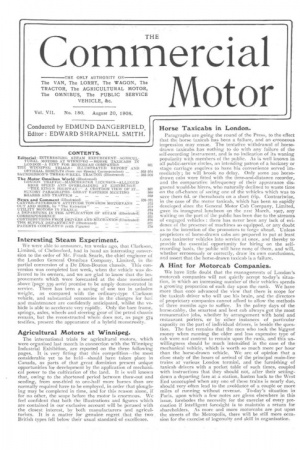Interesting Steam Experiment.
Page 1

If you've noticed an error in this article please click here to report it so we can fix it.
We were able to announce, ten weeks ago, that Clarkson, Limited, of Chelmsford, had in hand an interesting .conversion to the order of Mr. Frank Searle, the chief engineer, of the London General Omnibus Company, Limited, in the partial conversion of a De.Dion-Bouton chassis. This conversion was completed last week, when the vehicle was delivered to its owners, and we are glad to know that the improvements which were forecasted at the date mentioned above (page 339 ante) promise to be amply demonstrated in service. There has been a saving of one ton in unladen weight, as compared with the ordinary-type Clarkson vehicle, and substantial economies in the charges for fuel and maintenance are confidently anticipated, whilst the vehicle is able to accelerate very rapidly. Only the bare frame, springs, axles, wheels and steering gear of the petrol chassis remain, but the reconstructed whole does not, as page 574 testifies, present the appearance of a hybrid monstrosity.
Agricultural Motors at Winnipeg.
The international trials for agricultural motors, which were organised last month in connection with the Winnipeg Industrial Exhibition, are reported on the three following pages. It is very fitting that this competition—the most considerable yet to be held—should have taken place in Canada, as parts of that great dominion present unique opportunities for development by the application of mechanical power to the cultivation of the land. It is well known that, owing to the shortened period between thaw-out and seeding, from one-third to one-half more horses than are normally required have to be employed, in order that ploughing may be completed in time, and for this reason alone, if for no other, the scope before the motor is enormous. We feel confident that both the illustrations and figures which are contained in our exclusive account will be perused with the closest interest, by both manufacturers and agriculturists. It is a . matter. for genuine regret that, the two British types fell below their usual standard of excellence.
Horse Taxicabs in London.
Paragraphs are going the round of the Press, to the effect that the horse taxicab has been a failure, and an erroneous impression may ensue, The tentative withdrawal of horsedrawn taxicabs has nothing to do with any failure of the self-recording instrument, and is no indication of its waning popularity with members of the public. As is well known in all public-service circles, an intending patron of a hackney or stage carriage requires to have his convenience served immediately; he will brook no delay. Only some 200 horsedrawn cabs were fitted with the time-and-distance recorder, and the comparative infrequency of their appearance disgusted would-be hirers, who naturally declined to waste time on the off-chance of seeing one of the vehicles which was to save them 6d. or thereabouts on a short frip. Contrariwise, in the case of the motor taxicab, which has been so rapidly developed since the General Motor Cab Company, Limited, gave. its inaugural luncheon on the 2ist March, 1907, any waiting on the part of the public has been due to the streams of engaged vehicles : there has never been any lack of evidence of the presence of machines so equipped, or any doubt as to the intention of the promoters to forge ahead. Unless proprietors of horse-drawn cabs are prepared to put at least 1,000 taximeter vehicles into service at once, and thereby to provide the essential 'opportunity for hiring on the selfrecording basis, the public will have none of them, and will, whether erroneously or correctly, draw its own conclusions, and assert that the horse-drawn taxicab is a failure.
A Hint for Motorcab Companies.
We have little doubt that the managements of London's motel-cabcompanies will not quietly accept to-day's situation, in which an increasing number of their vehicles spends a growing proportion of each day upon the rank. We have more than once advanced the view that there is scope for the taxicab driver who will use his brain, and the directors of proprietary companies cannot afford to allow the methods of three months ago to suffice. In the palmy days of the horse-cabby, the sinartest and hest cab always got the Most remunerative jobs, whether by arrangement with hotel and restaurant porters, or by other instances of particular capacity on the part of individual drivers, is beside the question. The fact remains that the men who took the biggest money when running the older and less expensive type of cab were not content to remain upon the rank, and this unwillingness should be much intensified in the case of the mechanical vehicle, which is worth so much more per hour than the horse-drown vehicle. We are of opinion that a close study of the hours of arrival of the principal main-line trains at various London termini, and the furnishing of taxicab drivers with a pocket table of such times, coupled with instructions that they should not, after their settingdown a departing fare at a station, hasten back to the West End unoccupied when any one of these trains is nearly due, should very often lead to the avoidance of a couple or more miles of running without revenue. To-day's situation in Paris, upon which a few notes are given elsewhere in this issue, forebodes the necessity for the exercise of every precaution if intelligent foresight is to maintain a return for shareholders. As more and more motorcabs are put upon the streets of the .Metropolis, there will be still more occasion for the exercise of ingenuity and skill in organisation.


















